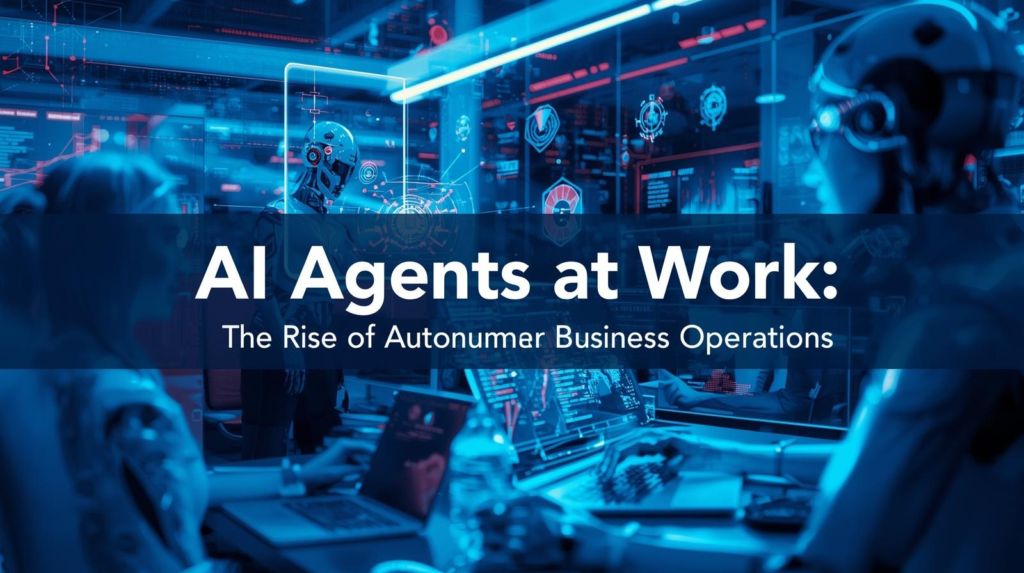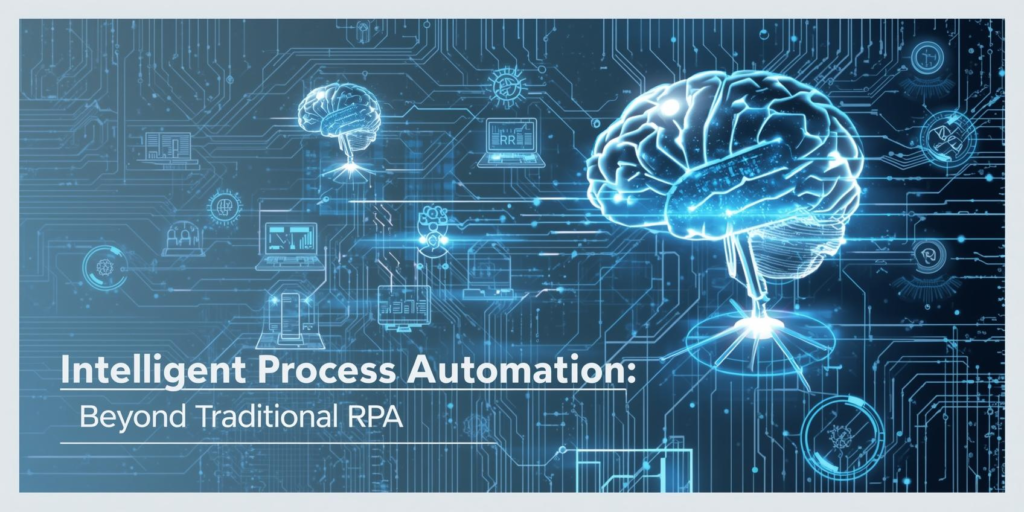
In the ever-evolving landscape of modern enterprises, the integration of artificial intelligence (AI) has transcended traditional automation. The emergence of AI agents is revolutionizing how organizations operate, enabling them to achieve unprecedented levels of efficiency, adaptability, and scalability. These intelligent entities are not merely tools; they are autonomous systems capable of executing complex tasks, making informed decisions, and continuously learning to optimize business processes. At AixCircle, we are at the forefront of this transformation, empowering businesses to harness the full potential of autonomous operations. By leveraging advanced AI technologies, we facilitate the creation of AI-driven workflows that streamline operations, enhance productivity, and drive innovation. In this comprehensive exploration, we delve into the significance of AI agents, their impact on business functions, and how enterprises can adopt them to stay competitive in the digital age.
Understanding AI Business Agents
AI business agents are sophisticated software systems designed to autonomously perform tasks, make decisions, and interact with various business applications. Unlike traditional automation tools that follow predefined scripts, AI agents possess the ability to adapt to changing conditions, learn from experiences, and optimize their actions over time. This adaptability makes them invaluable assets in dynamic business environments.
These agents utilize a combination of machine learning, natural language processing, and decision intelligence to understand context, process information, and execute tasks with minimal human intervention. Whether it’s handling customer inquiries, managing supply chains, or executing marketing campaigns, AI agents are equipped to manage a wide array of business functions
The Shift Toward Autonomous Operations
The transition from manual or semi-automated processes to autonomous operations marks a significant milestone in business evolution. Traditional workflows often involve multiple handoffs between departments, leading to delays, errors, and inefficiencies. AI agents streamline these processes by taking ownership of tasks end-to-end, ensuring seamless execution and real-time optimization.
For instance, in customer service, AI agents can autonomously handle inquiries, resolve issues, and escalate complex cases when necessary. In marketing, they can design, execute, and analyze campaigns, adjusting strategies based on real-time data to maximize engagement and ROI. This shift not only enhances operational efficiency but also frees up human resources to focus on strategic initiatives, fostering innovation and growth.
The Role of AI-Driven Workflows
Central to the functionality of AI agents is the concept of AI-driven workflows. These workflows are dynamic, data-driven processes that leverage AI capabilities to automate and optimize business operations. Unlike static workflows, AI-driven workflows can adapt to changing conditions, learn from outcomes, and continuously improve over time.
Implementing AI-driven workflows involves integrating AI agents into existing business systems, enabling them to access relevant data, make informed decisions, and execute tasks autonomously. This integration ensures that operations are not only efficient but also aligned with organizational goals, driving consistency and quality across all functions.
Intelligent Process Automation: Beyond Traditional RPA

While Robotic Process Automation (RPA) has been instrumental in automating repetitive tasks, it often lacks the intelligence to handle complex scenarios or adapt to unforeseen circumstances. Intelligent Process Automation (IPA), powered by AI agents, overcomes these limitations by incorporating cognitive capabilities into automation processes.
IPA enables AI agents to understand context, interpret unstructured data, and make decisions based on real-time information. This advanced level of automation allows businesses to tackle more intricate tasks, such as contract analysis, fraud detection, and personalized customer interactions, with greater accuracy and efficiency.
Building AI-Powered Enterprises
The integration of AI agents into business operations is a crucial step toward becoming an AI-powered enterprise. Such organizations leverage AI technologies to enhance decision-making, optimize processes, and deliver personalized experiences to customers. Building an AI-powered enterprise involves:
- Data Integration: Ensuring that AI agents have access to high-quality, real-time data from various sources within the organization.
- Scalability: Designing AI systems that can scale across different functions and adapt to growing business needs.
- Governance and Ethics: Establishing frameworks to ensure that AI agents operate transparently, ethically, and in compliance with regulations.
- Continuous Learning: Implementing mechanisms for AI agents to learn from experiences and improve their performance over time.
At AixCircle, we assist organizations in navigating this transformation by providing tailored AI solutions that align with their specific needs and objectives. Our expertise in AI integration ensures that businesses can harness the full potential of AI agents to drive innovation and achieve sustainable growth.
Real-World Applications of AI Agents
The impact of AI agents spans various industries and business functions. Some notable applications include:
- Customer Service: AI agents handle customer inquiries, provide support, and resolve issues autonomously, enhancing customer satisfaction and reducing operational costs.
- Marketing: AI agents design and execute marketing campaigns, analyze customer behavior, and adjust strategies in real-time to maximize engagement and ROI.
- Supply Chain Management: AI agents monitor inventory levels, predict demand, and optimize logistics, ensuring efficient and cost-effective supply chain operations.
- Human Resources: AI agents assist in recruitment, employee onboarding, and performance management, streamlining HR processes and improving employee experiences.
These applications demonstrate the versatility and effectiveness of AI agents in transforming business operations and delivering tangible results.
Overcoming Challenges in AI Agent Implementation
While the benefits of AI agents are substantial, organizations may encounter challenges during implementation. Common obstacles include:
- Integration with Legacy Systems: Ensuring compatibility between AI agents and existing IT infrastructure can be complex and resource-intensive.
- Data Quality and Availability: AI agents require access to accurate, real-time data to function effectively; poor data quality can hinder their performance.
- Change Management: Employees may resist adopting AI-driven processes; effective change management strategies are essential to facilitate smooth transitions.
- Security and Compliance: Safeguarding sensitive data and ensuring compliance with regulations are critical considerations in AI agent deployment.
To address these challenges, AixCircle provides comprehensive support, including system integration services, data management solutions, training programs, and security frameworks, ensuring a seamless and successful AI agent implementation.
The Future of AI Agents in Business
The future of AI agents in business is promising, with advancements in AI technologies continually expanding their capabilities. Emerging trends include:
- Multi-Agent Systems: The development of systems where multiple AI agents collaborate to achieve complex objectives, enhancing efficiency and innovation.
- Explainable AI: Efforts to make AI decision-making processes transparent and understandable, fostering trust and accountability.
- Edge Computing: The deployment of AI agents at the edge of networks, enabling real-time data processing and decision-making closer to data sources.
- Human-AI Collaboration: The evolution of AI agents from autonomous entities to collaborative partners, working alongside humans to achieve shared goals.
These trends indicate a future where AI agents play an integral role in every aspect of business operations, driving continuous improvement and transformation.
Conclusion
The rise of AI business agents signifies a paradigm shift in how enterprises operate, moving from traditional automation to intelligent, autonomous systems capable of executing complex tasks and making informed decisions. By embracing autonomous operations, organizations can enhance efficiency, adaptability, and scalability, positioning themselves for success in the digital era.
At AixCircle, we are committed to helping businesses navigate this transformation by providing innovative AI solutions tailored to their unique needs. Our expertise in developing and implementing AI-driven workflows and intelligent process automation ensures that organizations can harness the full potential of AI agents to drive growth, innovation, and competitive advantage.
As AI technology continues to evolve, the integration of AI agents into business operations will become increasingly essential. Enterprises that proactively adopt these technologies will be better equipped to meet the challenges of the future and capitalize on new opportunities, establishing themselves as leaders in the AI-powered business landscape.

